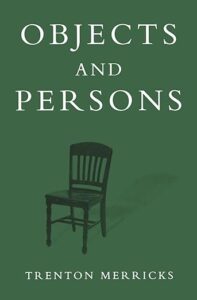In my initial critique of Hazony’s Conservatism: A Rediscovery, I noted some objections to the way he defines conservative and liberal. But in addition, Hazony falters in some of his philosophical commentary as well.
He tells us “there is much mediocre philosophy in circulation, and so one sometimes hears it said that There is no such things as a family, only the individuals who make up the family. This is analogous to the claim that There is no such thing as a table, only the atoms that make up the table – which we also hear on occasion.” The mediocre school of philosophical thought Hazony references, but does not name, is known as ontological antirealism.
To very briefly summarize this school of thought, suppose I gave you a standard deck of playing cards and asked you to count out how many things were. It would be very odd of you to say “There are 53 things here. First, there are 52 cards in the deck, plus there is also a deck of cards itself, which is one more thing, so the final count is 53.” There isn’t anything that itself is a “deck of cards,” that’s just a name we give to a collection of other things. In a nutshell, ontological antirealists extend that argument to everything that exists – that the things we see and name are not themselves individual things. They are really shorthand terms for groupings of smaller, individual things.
Now, had Hazony simply dismissed this school of thought and went on his way that would be fine. But oddly, in attempting to show how foolish it is, he ends up making an argument that is in fact identical to the argument ontological antirealists themselves make. He says that in order to effectively repair a table, he must think of it as a single entity, arguing “It is precisely because I regard the table as a whole as having a real existence, and a discernible good toward which it can be moved, that I am able to engage in practical efforts to repair it. No amount of tinkering with the thought that the table consists of atoms or molecules will help me in this context.” And he makes the same analogy for why it’s useful to think of societies or nations as having an independent composite existence rather than viewing it as a collection of individuals, saying the “king, president, or prime minister at the head of a nation can have the good of the collective as a whole before his mind. But he cannot move back and forth between considering the good of the nation as a whole and thinking about each individual under his rule—as the head of a household or the commander of a small military unit does—because it is impossible for him to be familiar with all of the individuals in his charge.”

But not only does this not contradict the arguments made by ontological antirealists, they actually say the same thing. Trenton Merricks, in his book Objects and Persons, argues that the existence of composite objects is technically false but “nearly as good as true.” That is, by viewing the world as if tables were things that had a real existence, we are able to make our way much more effectively through the world than if we attempted to view and interact with them as collections of particles.
Ontological antirealists believe that accepting the existence of ordinary objects is a pragmatically good idea because it’s cognitively useful and helps direct effective action – and Hazony, in attempting to show that ontological antirealists are mediocre thinkers, defends the idea of composite objects by arguing that they are cognitively useful and help direct effective action.
Hazony’s discussion of economics suffers from some factual errors along with theoretical weaknesses. He complains that the liberal commitment to free trade has resulted in policymakers “abandoning America’s manufacturing capabilities.” Here Hazony is making the all-too-common error of conflating America’s manufacturing capabilities with its manufacturing employment. This is no small thing – a decline in manufacturing employment does not imply a decline in manufacturing capacity, and in fact, while American manufacturing employment has declined, American’s manufacturing capabilities have only grown.
Conflating employment with capability would also lead one to worry that America’s capacity to produce food has plummeted over time. Farming represents a low single digit percentage of employment in America, whereas it was once the single largest source of American employment. This does not mean farming capacity has fallen – it has risen, drastically, due to improvements in technology that allow more food to be produced with fewer workers. This is how economic growth works, and what brings about increases in material prosperity. Granted, America does participate in a global food market as well, but in both farming and manufacturing, the jobs lost to trade are utterly dwarfed by the jobs lost to labor-saving technological improvements. Far more American farming jobs were lost to the combine harvester than to Colombian farmers. If the loss of manufacturing employment is truly Hazony’s concern, he’s unduly focused on what amounts to a trivial factor in that regard – he should be spending far more time attempting to put an end to technological progress itself. If, however, Hazony is concerned with manufacturing capabilities, as he says, then he one less thing to worry about – America’s manufacturing capabilities have only been increasing.
Hazony also argues that free trade undermines the bonds of mutual loyalty on which nations depend, but he never really fleshes this out other than by repeatedly invoking the idea of mutual loyalty among fellow citizens. But this doesn’t go where Hazony wants it to go. Suppose I’m looking to build a house, and I need to purchase a certain amount of lumber to do so. Walter, from Washington state, can provide me what I need at a certain price. However, Carl the Canadian can also offer me the same lumber at the same quality, but Carl’s selling price is $35,000 lower. Under free trade, I am free to favor Walter over Carl, because I prefer to buy from an American, or I may also choose to buy from Carl over Walter to save a significant sum of money. Presumably, Hazony thinks there is an obligation rooted in loyalty to buy from Walter over Carl, but it’s not clear why. After all, what Hazony invokes so often is the idea of mutual loyalty – and the thing about mutual loyalty is that it’s mutual. The obligation goes in both directions. So why would we say I’m failing to show Walter proper loyalty by buying from Carl? Why not say Walter would be failing to show proper loyalty to me, by insisting I buy from him despite the huge additional financial burden it would impose on me? Simply saying “mutual loyalty” does nothing to resolve this. Additionally, with the $35,000 I’d save buying Canadian lumber from Carl, I could support other businesses that might provide furnishings to my new home or hire landscapers to help design and build up the yard. Would it be failing to show proper “mutual loyalty” to those unseen people, by buying from Walter? Hazony offers nothing that answers these questions, or even acknowledge their existence.
In my next and last post, I’ll be examining Hazony’s arguments regarding religion and his claims of its necessary connection to the conservatism he advocates.


READER COMMENTS
Richard Fulmer
Nov 28 2023 at 2:42pm
Great point. And you might add that Walter would display not only disloyalty to you but downright hostility and contempt if he were to ask the government to force you to buy from him rather than from Carl.
Comments are closed.